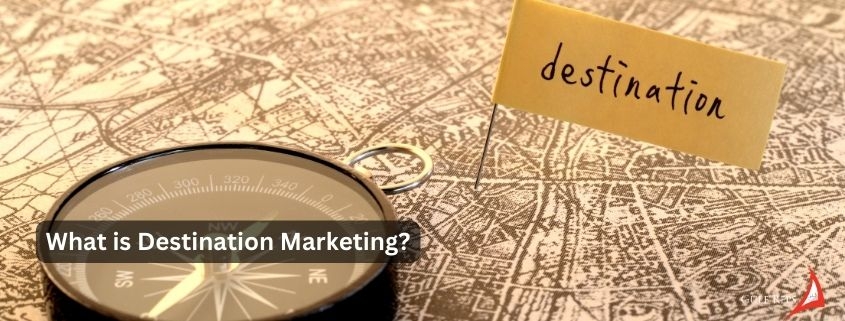What is Destination Marketing?
In the dynamic world of travel and tourism, destination marketing has emerged as a critical strategy to boost tourism and stimulate economic growth. This comprehensive guide delves into the concept of destination marketing, its importance, advantages, and various successful strategies that can help travel businesses, governments, and tourism boards attract more visitors to their destinations.
Understanding Destination Marketing
Also known as tourism marketing, is a marketing strategy that focuses on promoting a specific location or destination to potential tourists. This location could range from a small town or city to an entire country or even a specific resort or tourist attraction.
The primary objective of destination marketing is to increase the destination’s visibility and appeal to the potential tourists, encouraging them to consider visiting it. This strategy often involves showcasing the unique attractions, experiences, and benefits that the destination offers, generating an emotional connection that drives the desire to visit.
The Significance of Destination Marketing
It plays an invaluable role in boosting tourism and fostering economic development. It helps to:
- Capture Audience Attention: By creating compelling marketing campaigns and narratives around a destination, marketers can engage their target audience effectively, increasing the chances of conversion.
- Build Brand Awareness: Consistent and strategic destination marketing helps establish a strong brand identity for the destination, increasing its recognition and reputation among potential tourists.
- Promote Local Economy: By attracting more tourists, destination marketing can significantly contribute to the local economy, benefiting various sectors such as hospitality, restaurants, retail, and transportation.
The Power of Destination Marketing: Key Advantages
It offers a slew of benefits that make it a strategic choice for businesses in the travel and tourism sector:
Emotional Engagement
One of the standout advantages of destination marketing is its ability to tap into the emotional responses of potential tourists. By showcasing the unique experiences and stories associated with a location, marketers can evoke a sense of curiosity, adventure, and anticipation among their audience, leading to higher conversion rates.
Trust and Credibility
Destination marketing also helps build trust and credibility for your brand. By providing valuable and authentic information about a destination, sharing testimonials, or offering exclusive guides, businesses can position themselves as reliable and trustworthy experts in their target destinations.
Boost to Local Economy
Destination marketing is not just beneficial for businesses but also for the local economy. By attracting more tourists, it boosts local businesses, creates jobs, and contributes to the overall economic development of the area.
Successful Destination Marketing Strategies
Implementing effective destination marketing strategies can significantly enhance a location’s appeal and tourist footfall. Here are some tried-and-tested strategies that can help you achieve your destination marketing goals:
1. Know Your Target Audience
Understanding your target audience is the first step towards creating a successful destination marketing strategy. Identify the preferences, needs, and behaviors of your potential tourists to tailor your marketing efforts accordingly.
2. Leverage the Power of Pain Points
Identify the pain points of your target audience and offer solutions through your destination’s offerings. This approach can stir an emotional response and motivate potential tourists to choose your destination.
3. Highlight Unique Selling Points
Each destination has its unique selling points (USPs) that set it apart from others. Identify and emphasize these USPs in your marketing campaigns to make your destination stand out.
4. Analyze Your Competitors
Understanding what other travel brands are doing to market similar destinations can provide valuable insights. Analyze their strategies and identify any gaps that your brand can fill.
5. Embrace Video Marketing
Video marketing is a powerful tool in destination marketing. It provides a vivid and engaging depiction of a destination, enticing viewers with immersive visuals and narratives.
6. Focus on Visual Content
Visual content plays a crucial role in destination marketing. High-quality images, infographics, and videos can engage your audience, evoke emotions, and inspire them to visit your destination.
7. Collaborate with Influencers
Influencer marketing can provide an authentic and relatable perspective of your destination. Collaborating with influencers can help you reach a wider audience and enhance your destination’s appeal.
8. Break the Stereotypes
Try to offer something unique and valuable to your audience that goes beyond the typical stereotypes associated with certain destinations. This creative approach can make your destination more appealing and memorable.
Developing Your Destination Marketing Plan
Creating an effective plan involves several key steps:
1. Define Your Goals
Start by defining clear and measurable goals for your marketing campaigns. These could be increasing website traffic, boosting brand awareness, improving conversion rates, or growing your social media following.
2. Understand Your Audience
Identify the specific segments of your audience that your destination appeals to. Understand their preferences, motivations, and travel habits to tailor your marketing efforts to their needs.
3. Conduct Competitor Analysis
Analyze your competitors’ strategies to identify gaps and opportunities. This analysis can provide valuable insights into what works and what doesn’t in your target market.
4. Develop Your Marketing Strategy
Based on your goals, audience understanding, and competitor analysis, develop a comprehensive marketing strategy. This should include your key marketing messages, channels, tactics, and metrics for success.
5. Implement and Monitor Your Plan
Once your plan is in place, implement it and monitor the results. Use analytics tools to track your progress and make adjustments as needed to optimize your efforts.
Leveraging Technology in Destination Marketing
Technological advancements have opened up new avenues for destination marketing. Here are some tech trends reshaping the landscape:
Virtual Reality Marketing
Virtual reality (VR) offers an immersive experience that can give potential tourists a virtual tour of your destination. This can be a powerful tool to showcase the unique experiences and attractions your destination offers.
Social Media Advertising
Social media platforms offer various advertising options that can help you reach a wider audience. From sponsored posts to targeted ads, social media advertising can be a cost-effective way to promote your destination.
SEO and Content Marketing
Search engine optimization (SEO) and content marketing play a crucial role in driving organic traffic to your website. Creating high-quality, SEO-friendly content can improve your search engine rankings and attract more potential tourists to your destination.
Wrapping Up
Destination marketing is a powerful strategy for promoting a location and boosting its tourism prospects. By understanding your audience, leveraging unique selling points, implementing effective marketing strategies, and harnessing the power of technology, you can create compelling narratives that attract more visitors to your destination.
Remember, successful destination marketing is not just about attracting tourists. It’s about creating memorable experiences that make them want to come back and share their positive experiences with others. This not only helps boost tourism but also contributes to the overall economic development of the destination.
Further Readings
If you’re interested in diving deeper into the world of destination marketing, you may find the following articles helpful:
- SEO Strategies for Travel Websites
- The Role of SEO in Travel Marketing
- Tourism Trends: Opportunities for The Tourism Industry
- Key Technology Trends Emerging in the Travel & Tourism Industry
- The Latest Travel Marketing Tips to Optimize Your Results
In the end, successful destination marketing is about crafting a compelling story about your destination that resonates with your target audience and motivates them to visit. With the right strategies and tools, you can turn your destination into a sought-after tourist hotspot.
Gulf Reps
Gulf Reps is the leading travel and tourism representation company in the Middle East, with over 60 years of regional and industry experience. Specializing in directing the Arab traveler segment to your region or destination, we have served clients on six continents, delivering transformative results to everyone from hoteliers to tourism boards.
Our mix of world-class marketing expertise, PR specialists, unparalleled connections and relationships, plus our eclectic mix of marketing channels, makes working with Gulf Reps the only sure way to drive Middle Eastern tourists to your destination.
To find out more about our services, you can call us at +971 (0)4 703 6333 or write to us at sammy@gulfreps.com



